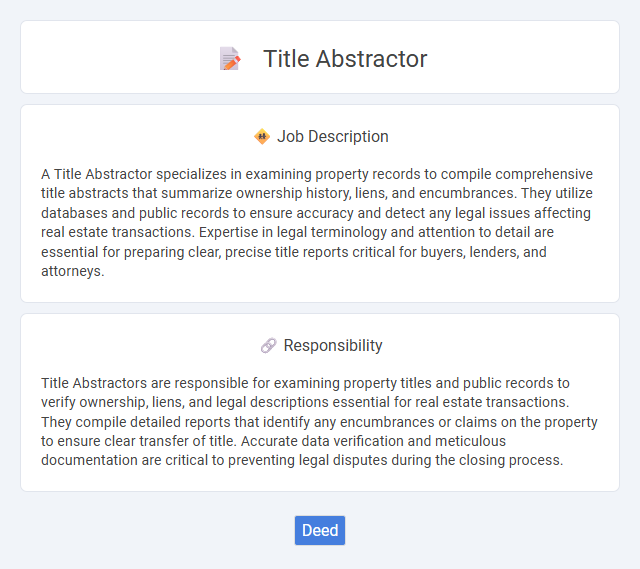
A Title Abstractor specializes in examining property records to compile comprehensive title abstracts that summarize ownership history, liens, and encumbrances. They utilize databases and public records to ensure accuracy and detect any legal issues affecting real estate transactions. Expertise in legal terminology and attention to detail are essential for preparing clear, precise title reports critical for buyers, lenders, and attorneys.
Individuals with strong attention to detail and analytical skills are more likely to be suitable for a Title Abstractor position, as the role involves reviewing property records for accuracy and legal compliance. People who prefer structured, research-oriented tasks and can handle repetitive data analysis might find this job well-matched to their strengths. Those who struggle with meticulous documentation or have difficulty interpreting complex legal descriptions may encounter challenges in performing effectively as a Title Abstractor.
Qualification
A Title Abstractor requires strong knowledge of property records, legal documents, and title chains to accurately compile ownership histories. Proficiency in researching public records, attention to detail, and experience with title software systems are essential for ensuring clear and marketable titles. Effective communication skills and understanding of real estate laws enhance the ability to resolve discrepancies and support title insurance processes.
Responsibility
Title Abstractors are responsible for examining property titles and public records to verify ownership, liens, and legal descriptions essential for real estate transactions. They compile detailed reports that identify any encumbrances or claims on the property to ensure clear transfer of title. Accurate data verification and meticulous documentation are critical to preventing legal disputes during the closing process.
Benefit
A Title Abstractor likely offers significant benefits by ensuring accurate and thorough property title searches, which may reduce the risk of legal disputes and financial losses. Efficient title abstraction processes can improve real estate transaction timelines, increasing overall client satisfaction. Their expertise potentially enhances the reliability of title reports, providing confidence to buyers, sellers, and lenders.
Challenge
Title abstractor roles likely involve significant challenges such as navigating complex legal terminology and ensuring absolute accuracy in property records. The probability of encountering discrepancies or incomplete documents may demand meticulous attention to detail and strong problem-solving skills. Such challenges could impact the efficiency and reliability of real estate transactions, highlighting the critical nature of the position.
Career Advancement
Title Abstractor professionals can rapidly advance their careers by gaining expertise in property records research and legal documentation. Mastery of title examination software and understanding of real estate law significantly enhance job prospects and eligibility for supervisory roles. Pursuing certifications such as the Certified Title Examiner (CTE) can further open opportunities for leadership positions and higher salaries.
Key Terms
Deed
A Title Abstractor specializes in examining property deeds to verify ownership history, identify liens, encumbrances, and legal limitations affecting real estate titles. This role requires meticulous review of public records, including deed transfers, mortgage documents, and tax assessments, ensuring accuracy for title insurance and real estate transactions. Expertise in deed interpretation helps prevent future legal disputes by confirming clear property titles and rightful ownership.
 kuljobs.com
kuljobs.com